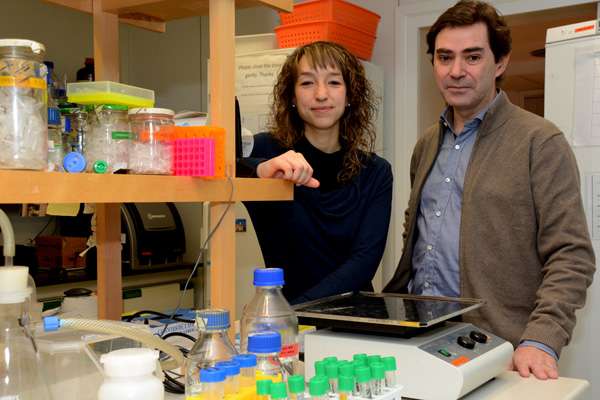UB researchers Mónica Pardo and Josep M.ª Canals participate in a study that opens a new door to the development of therapies for the first stages of the appearance of the Huntington disease’s symptoms.
Huntington's disease could alter neurons from when they start developing, according to a study conducted by the international HD iPSC Consortium. The study was published in the scientific journal Nature Neuroscience.
The study shows that the genes involved in the development of the stretchmark nucleus, the affected structure of the nervous system, are already altered during the process when neurons are created. According to the researchers, these results could change treatments for the disease, which has no cure.
Huntington's disease is a progressive and irreversible neurodegenerative disease caused by the mutation of the gene that codifies the Huntington protein. This is a hereditary rare disease with only five-seven affected people (out of 100.000) in western countries.
According to Josep M. Canals, researcher at the Institute of Neurosciences of the University of Barcelona, "Despite being a genetic disease, it was thus far thought that the development of the nervous system of the patients was correct until the patient ages and some symptoms such as motor alterations (chorea, stiffness, etc.), cognitive deficiencies and psychiatric disorders start coming up. Our details show that there are subtle signs of alterations in the development of the neurons of these patients, which are not the same as normal neurons."
Study with iPSC cells from patients
The first phase of the study, led by the group of the UB, consisted of an analysis of gene expression during the striatal development in animal models, which was later compared to the gene expression of neurons from human iPSC cells. iPSCs are skin cells reprogrammed with transcription factors so that they function as pluripotent stem cells similar to embryonic cells, with the ability to differentiate in any kind of specialized cell—in this case, neurons. This process enables studying the effects of genetic mutation in the cells affected by the disease.
When researchers crossed genic expression data, they detected that more than 600 genes responsible for development were altered in Huntington's patients' cells. Out of this list of altered genes, they selected the most important ones and then focused on a special pathway, the expression of which can be controlled with a drug: ISX-9 molecule. This drug was given in vitro to patient's cells and also to model mice with neuroprotective effects. "The drug reversed some of the markers: there was an increase of synapse and improvements at a cognitive level in model mice with the disease, which improved in memory tests" says Mónica Pardo, first author of the UB group.
"The results show that neurons in Huntington's patients, although they have the same function as normal neurons, are not totally the same and by acting on developing altered genes could reverse and lower symptoms," says Canals.
New view for the disease
According to the researchers, this study involves a change of the view on Huntington's disease evolution. "Instead of waiting for the symptoms to come up, maybe we should act on malfunctioning neurons before with drugs or inciting the activity of affected neurons like it is done in other diseases such as Parkinson," says Canals.
Among the current objectives of the HD iPSC Consortium is to widen the study with a wider range of patients in order to find out which genes are systematically and uniformly altered among them. Therefore, new precise therapeutic targets can be established in order to create new drugs to treat the disease.
More information: Ryan G Lim et al. Developmental alterations in Huntington's disease neural cells and pharmacological rescue in cells and mice, Nature Neuroscience (2017). DOI: 10.1038/nn.4532
Journal information: Nature Neuroscience
Provided by University of Barcelona





















